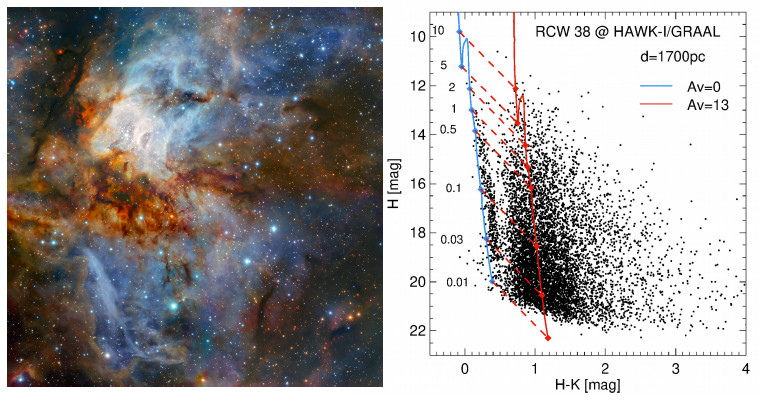| EPoS Contribution |
|
Probing the effects of environment on star and brown dwarf formation
Karolina Kubiak U Lisbon, Lisbon, PT | |
| Brown dwarfs are a critical link between the realms of stars and planets. Their formation process is one of the crucial missing pieces in our understanding of how star and planet formation work. Understanding the origin of brown dwarfs is the main motivation for recent deep studies of star-forming regions and young clusters. The major question driving our studies is whether the birth environment affects their formation efficiency, as predicted in several formation scenarios. The expectation is that high gas or stellar densities or the presence of massive OB stars may be factors that boost the incidence of newly formed brown dwarfs with respect to stars. To address this question we investigate the stellar and sub-stellar objects in the drastically different environments of massive young clusters RCW 38 and NGC 2244 and that of nearby star-forming regions. Here we will present the current status of young brown dwarf studies, compare the low-mass Initial Mass Functions in a variety of Milky Way environments. For RCW38, we will address the high-mass IMF and the shallow slope that we see in the center (mass segregation or not?). We will summarised the implications of these results for our understanding of sub-stellar formation processes. | |
 | |
| Caption: Left: JHK colour-composite of RCW 38 obtained by Hawk-I/GRAAL during the SV. Right: Colour magnitude diagram for the point sources detected in the image to the left. The solid lines show the stellar evolutionary models at 1 Myr, without extinction (blue) and at the average extinction of the cluster (Av=13). The model masses are marked to the left of the blue isochrone, in solar masses. This figure demonstrates that substellar objects can easily be detected even at kpc distances and with a significant amount of reddening. | |
| Collaborators: K. Muzic, U Lisbon, PT V. Almendros-Abad, U Lisbon, PT A. Moitinho, U Lisbon, PT J. Ascenso, U Porto, PT R. Schoedel, CSIS, ES A. Scholz, U St.Andrews, GB |
Suggested Session:
Galactic Dynamics |

